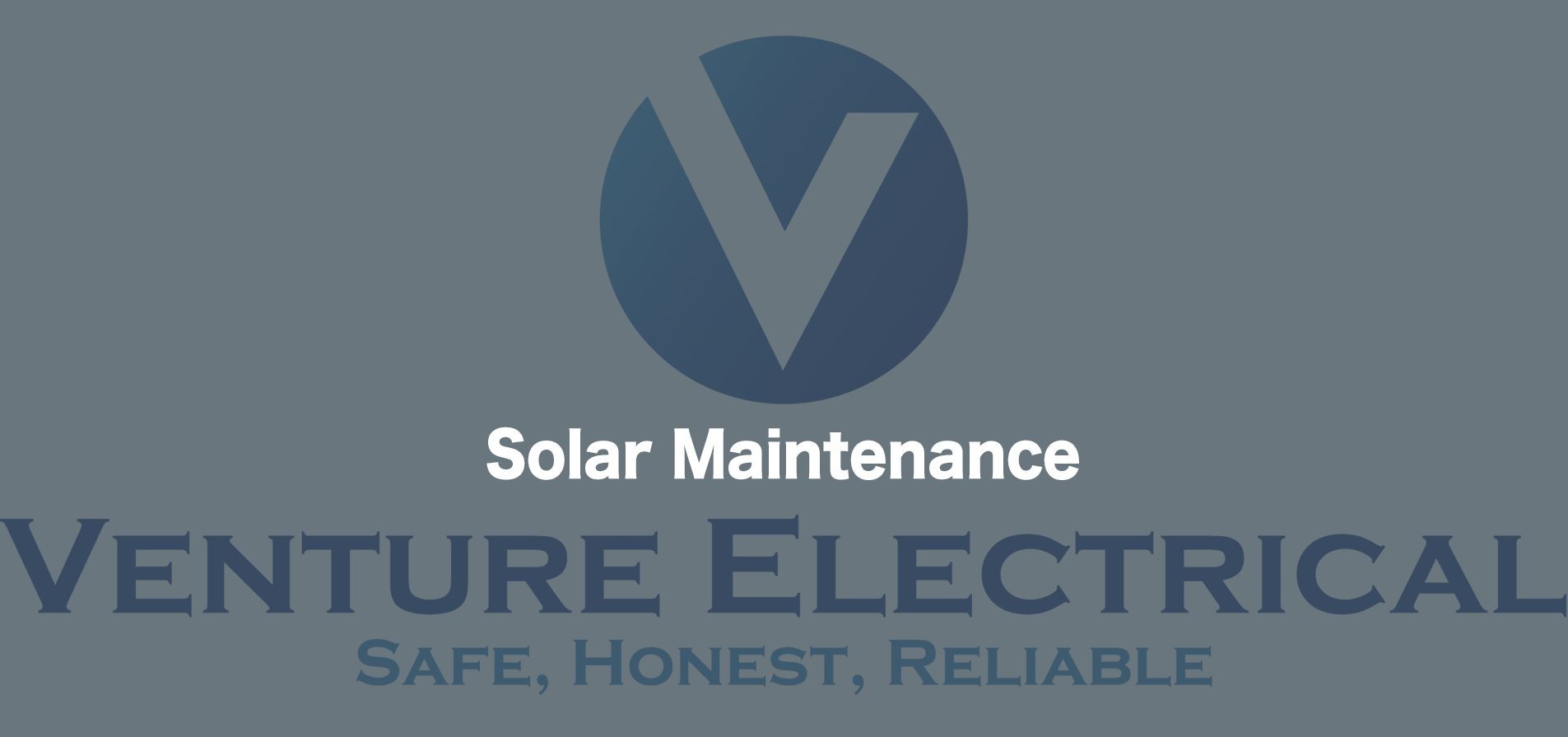Solar Maintenance Services
Hey there! If you're considering getting a solar PV system installed, I wanted to share with you why it's important to have a maintenance plan in place.
Think of it like this - you wouldn't buy a car and never get it serviced, right? The same goes for your solar PV system. By having a maintenance plan, you can catch any potential issues early and ensure your system is running at maximum efficiency. This means you'll get the most out of your investment and enjoy lower energy bills. Plus, it can help extend the lifespan of your system, saving you money in the long run. At Venture Electrical Ltd, we're happy to work with you to create a customised maintenance plan that fits your specific needs. So, let's keep your solar PV system shining bright!
Top 5 maintenance tasks
The top 5 solar PV maintenance tasks are:
- Cleaning: Dust, dirt, and other debris can accumulate on solar panels, which can reduce their efficiency. Regular cleaning can help ensure that the panels are working at maximum capacity.
- Inspections: Regular inspections can help detect any issues with the solar PV system before they become major problems. This includes checking for loose connections, cracks, or other damage.
- Monitoring: Monitoring the performance of the solar PV system is important to ensure that it is producing the expected amount of electricity. This can involve using monitoring software or other tools to track the system's output.
- Inverter Maintenance: The inverter is a critical component of a solar PV system that converts the DC power generated by the panels into AC power that can be used in the home or fed back into the grid. Regular maintenance of the inverter can help ensure that it is working properly and efficiently.
- Battery Maintenance: If the solar PV system includes a battery backup, it's important to maintain the battery to ensure that it has sufficient capacity to store energy when it is needed. This can include regular testing, cleaning, and replacement of the battery as needed.
Contact us
Solar Panel Component Maintenace
Inverters are also essential for solar systems as they allow direct current (DC) power generated from the PV array to be converted into alternating current (AC) power, which can then be used in homes or businesses. Furthermore, additional components such as battery storage may be incorporated to store excess energy generated by the system for later usage during periods when there’s no sunlight available, like nights or cloudy days.
Regular checks should be done on all components of a solar system to ensure proper functioning, such as examining wiring connections for signs of corrosion or loose connections, inspecting the panels for any damage or defects, and checking inverter performance with diagnostic tests.
Solar energy is a clean, renewable energy source that can be harnessed to provide electricity and hot water. It's a great way to reduce your carbon footprint while reducing your utility bills. There are many advantages of installing solar panels in homes and businesses.
Benefits Of Regular Maintenance
Regular maintenance of solar systems is essential for ensuring that they run efficiently and safely. It offers several benefits, including improved energy efficiency, better system performance, and fewer repair costs.
Firstly, regular maintenance ensures that the solar system will operate at its maximum efficiency. Solar panels should be kept clean to ensure that they are able to absorb as much sunlight as possible. If dirt or dust accumulates on the panels, it can reduce their output by up to 25%. In addition, electrical connections need to be checked regularly to make sure there are no loose connections or corrosion which could affect the performance of the system.
Secondly, regular maintenance can help prevent costly repairs down the line. With less dirt and dust on the panels and proper electrical connections in place, any potential issues with the system can be identified before they become a major problem. This reduces the chance of needing an expensive repair in the future due to a problem that could have been avoided with regular inspection and maintenance.
Finally, regular maintenance increases safety by reducing any potential hazards associated with the solar system. Electrical connections should be checked for any signs of corrosion or damage which could cause a short circuit or fire hazard if left unchecked. In addition, checking for leaks in any pipes connected to water-cooled systems can help avoid water damage from occurring if a leak develops over time. Regular maintenance helps ensure that these issues are addressed before becoming serious problems which could potentially put people at risk of injury or property damage.
Tools And Materials Needed For Maintenance
When it comes to solar maintenance services, there are a few important tools and materials that must be on-hand. For starters, a quality set of screwdrivers is essential for any kind of adjustment or repair work. Phillips and flathead screwdrivers should be included in the set, as well as a Torx driver for specialized screws. Additionally, you'll want a pair of pliers and wire cutters so you can make adjustments to wiring or terminals.
Other materials needed include replacement parts like fuses and circuit breakers, electrical tape, sealants, lubricants, and safety guards. It's also important to have non-conductive gloves on hand in case any wires need to be handled directly. If high voltage systems are being worked on, then an insulated coverall suit should also be included in the supplies.
Having all these materials ready will ensure that maintenance services can go smoothly without any hiccups or delays due to lack of appropriate equipment. This way, technicians will have everything they need in order to perform their job efficiently and safely.
Common Issues With Solar Systems
Now that you know the tools and materials needed for maintenance, it's important to understand what some of the common issues are with solar systems. Solar systems have many components, each of which can experience issues due to normal wear and tear, or from other outside factors.
The most common issue is a decrease in efficiency due to dirt and debris buildup on the panels. This can reduce the amount of sunlight reaching the cells, reducing their power output. Cleaning the panels regularly can help mitigate this issue and keep your system running at its optimal efficiency.
Another possible issue is corrosion or damage to any wiring or electronics inside the solar system, which can cause it to malfunction or stop working altogether. Regular inspections of the wiring should be done to catch any problems before they become major repairs. Additionally, if you ever notice anything unusual with your system’s performance, it’s best to contact a professional immediately.
Proper maintenance is key in ensuring that your solar system runs smoothly and efficiently. By being aware of potential issues and staying on top of regular maintenance tasks, you can prevent these issues from arising in the first place.
Preventative Measures To Reduce Breakdowns
Preventative measures are the best way to reduce breakdowns of solar panel systems. Regular maintenance and checkups can identify issues before they become serious, allowing for timely repair or replacement of components. Having a qualified technician check your system on a regular basis is key to keeping it running efficiently.
The first step in preventative maintenance is inspecting the wiring and connections for any signs of corrosion or wear. Any corroded or worn connections should be repaired or replaced immediately to avoid further damage. The technician should also check cables and cable clamps to ensure they are secured properly and not frayed. It's also important to make sure all electrical components, such as junction boxes, fuses, and circuit breakers, are functioning correctly.
It's also important to inspect the panels themselves for any dirt or debris that may have collected over time. This can reduce the efficiency of the system by blocking sunlight from reaching the panels. Additionally, checking the mounting equipment regularly will help ensure that everything is secure and still in good condition.
All these steps will help keep your solar system running smoothly and efficiently for many years to come. Properly maintaining your system will not only increase its life expectancy but also save money in the long run by avoiding costly repairs down the line.
Diy Maintenance Vs Professional Services
When it comes to maintaining a solar panel system, there are two main options: DIY maintenance and professional services. DIY maintenance involves the homeowner or business owner taking on the responsibility of regular upkeep and performing minor repairs themselves. Professional services involve hiring a qualified technician to inspect and maintain the system, as well as carrying out any necessary repairs.
DIY maintenance can be cost-effective in some cases, but it is important to have a basic understanding of how your solar panel system works before attempting any repairs. Additionally, without proper knowledge, it can be easy to overlook important components that need attention or make mistakes that could ultimately damage the system. Therefore, if you decide to go this route, it is essential that you do your research beforehand and consult an expert if needed.
Professional services come with the added assurance that your solar panel system will be properly inspected and maintained by an experienced technician. This ensures that all necessary components are looked after and any potential issues are addressed quickly before they become more expensive problems down the line. Furthermore, having access to a knowledgeable technician means you can have peace of mind knowing your system is in good hands.
Overall, both DIY maintenance and professional services provide their own set of advantages and disadvantages when it comes to maintaining your solar panel system. It is important to weigh each option carefully before deciding which one best suits your needs and budget.
Hiring A Qualified Technician
When considering the best option for maintaining a solar energy system, it is important to consider hiring a qualified technician. Professional services can provide the expertise needed to ensure safety and the proper functioning of the equipment. Additionally, they can help identify any potential problems before they become serious issues.
When looking for a technician to hire, be sure to research their experience and qualifications. Ask for references from previous clients. It is also recommended that individuals check with local organizations or associations to find out which technicians are certified or licensed in their field. The technician should be able to explain all of the procedures that will be used in order to maintain the system correctly and safely.
It is important to remember that hiring a qualified technician does not guarantee success with the maintenance of the solar energy system. However, it does provide assurance that it will be done properly and efficiently using industry-standard procedures. Taking this step can help protect investments and ensure smooth operation of the system over time.
Cost Of Services
When it comes to solar maintenance services, cost is always a consideration. Fortunately, most companies offer competitive prices for their services. Solar maintenance costs can vary depending on the type of service needed and the amount of work required.
The cost of basic maintenance is usually quite low. This includes checking and cleaning your solar panels, as well as replacing any broken or malfunctioning parts. Basic maintenance may also include inspections to ensure that all components are functioning properly. Additionally, some companies offer discounts if you purchase multiple services at once.
More complex services such as repairs and panel installation will require a higher fee. The exact cost depends on the complexity of the job, as well as the materials used. Companies may also have minimum charges for certain services, so make sure to check this when requesting quotes from different companies.
Overall, solar maintenance fees are reasonable and should not deter homeowners from investing in solar energy systems. It's best to shop around and compare quotes from different companies before making a decision about which one to go with.
Warranties And Insurance Policies
At Solar Maintenance Services, we offer warranties on all of our services for up to one year. This warranty covers any defects in the materials or workmanship caused by us, and we'll make sure to fix any issues at no extra charge. We also carry a liability insurance policy that will protect you from any injuries or damages that may arise while working on your solar system.
We take your safety seriously, so all of our technicians are certified and fully insured. We only use the best quality parts and materials, so you can trust that your solar system will be in good hands. We also have a thorough installation process that ensures everything is installed correctly and safely.
Our warranties and insurance policies provide you with peace of mind knowing that we stand behind our services and products. We guarantee satisfaction with every job we do, making sure each customer is completely happy before leaving the premises.
Best Practices For Maintaining Solar Panels
To ensure that solar panels continue to perform optimally, there are several best practices to follow. First and foremost, panels should be regularly cleaned with a soft cloth or brush. This will help remove any dirt and dust buildup that can reduce the panel’s efficiency. Additionally, it is important to tightly secure all electrical connections, as loose connections can lead to power loss and electric fires. Lastly, it is essential to check for signs of damage on the panels periodically. Any damaged parts should be replaced immediately in order to avoid further issues and keep the system running efficiently.
It is also important to have regular maintenance checks conducted by an experienced technician. A professional can inspect all components of the system, including wiring, inverters and mounting hardware, which helps identify potential problems before they become serious. Furthermore, they can provide advice on how to maximize energy efficiency and keep the system functioning properly over time.
Regularly monitoring the system performance is key for keeping solar panels in good condition. By using a monitoring system or mobile app, homeowners can easily track their energy production on a daily basis and identify any issues early on. Furthermore, this provides insight into how effective the system has been since its installation and how much energy it has saved over time.
Frequently Asked Questions
The process of installing a solar panel system can vary from one project to the next, but generally speaking, it doesn't take too long. Depending on the size and scope of the project, the installation could take anywhere from a few hours to a few days. However, if you're only installing a couple of panels to power your home energy needs, it could be completed in just a matter of hours.
When considering the overall timeline for getting your solar panel system up and running, there are several factors that need to be taken into account. First, you'll have to factor in the time it takes to prepare the site. This includes clearing any obstructions such as trees or debris that may be present on your property. Additionally, permits may need to be acquired in order for you to move forward with the installation process. Once all of this is taken care of, then comes the actual installation itself which can take anywhere from 8-12 hours depending on how large your system is.
Finally, once everything is installed and connected properly, it's important that you set up monitoring equipment so you can keep an eye on your system's performance over time. This will help ensure that your panels are operating at peak efficiency and that you're getting the most out of them. In addition, regular maintenance should also be performed every now and again so that any potential issues can be addressed as soon as possible. All in all, with proper planning and preparation beforehand, installing a solar panel system shouldn't take more than one or two days at most.
Investing in solar power is an increasingly popular decision for homeowners and businesses alike. With the rising cost of energy, more and more people are looking to renewable energy sources as a way to reduce their monthly bills and be better stewards of the environment. But what are some of the long-term benefits that come with investing in solar power?
For starters, installing a solar panel system can provide significant savings over time. Solar panels use the sun’s energy to generate electricity, which means that you no longer have to rely on traditional sources of energy like coal or natural gas. This translates into reduced electricity bills as well as fewer emissions from fossil fuels. Additionally, many utilities offer incentives for those who choose to go solar, such as net metering programs which allow excess energy generated by the panels to be credited back onto your bill.
Another key benefit of investing in solar power is its resilience during extreme weather events like hurricanes and heat waves. Traditional sources of energy can often succumb to these events due to downed power lines or outages caused by high demand on the grid. Solar panels, however, are unaffected by these occurrences since they are powered directly from the sun’s rays, meaning your home or business will stay up and running even when other sources fail.
Solar power also has a number of environmental benefits associated with it. Solar panels do not emit any air pollutants or greenhouse gases while generating electricity and require little maintenance once they’re installed. Moreover, they help reduce our dependence on fossil fuels while providing sustainable energy solutions that can produce clean electricity for decades after installation. This makes them an ideal choice for those looking to make an impact on climate change while saving money in the long run.
Overall, investing in solar power provides numerous advantages both financially and environmentally over traditional energy sources, making it an attractive option for those looking for ways to reduce their carbon footprint while saving money at the same time.
Investing in solar power has become increasingly popular in recent years, and with good reason. The long-term benefits are numerous, from reduced electricity costs to environmental protection. But before making the investment, it's important to consider if there are any restrictions on where solar panel systems can be installed.
The answer depends largely on your location. Generally speaking, most places allow for installation of solar panels on residential properties. However, some local governments may have additional regulations or requirements that must be met before installation can begin. In some cases, homeowners may need to obtain a permit or approval from their city hall or local planning commission before they get started.
In addition to local regulations and requirements, you should also be aware of potential restrictions imposed by homeowners' associations (HOAs). HOAs often have specific rules and guidelines that must be followed when installing solar systems on property within the association's boundaries. If you're considering investing in solar energy within an HOA community, it is best to review the HOA's rules and regulations beforehand to ensure all necessary steps are taken prior to installation.
It is also important to know that not all rooftops are suitable for mounting solar panels. The roof structure needs to be able to support the weight of the system and provide adequate exposure for optimal energy production. Professional installers can assess whether your roof is suitable for solar panel installation and help identify any potential obstacles that could affect performance or safety during installation.
Local Electrical Services Liverpool
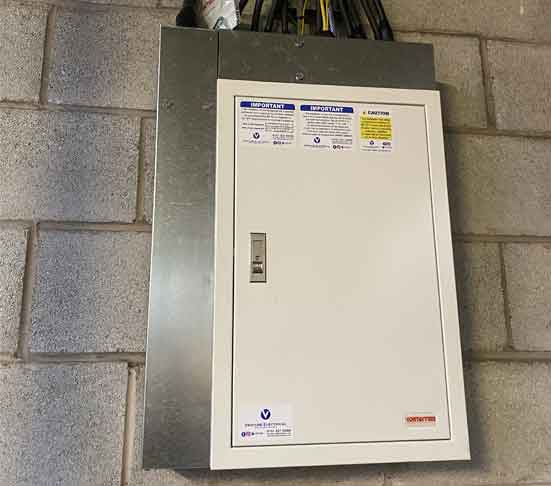
Distribution Board (Fuse Box)
Looking for a reliable electrical service in Liverpool? Look no further than Venture Electrical Ltd! Our team of expert electricians specialize in installing, repairing, and upgrading distribution boards and fuse boxes. We pride ourselves on providing top-quality service at affordable prices. Contact us today for all your electrical needs!
Fuse Box/Consumer Unit Information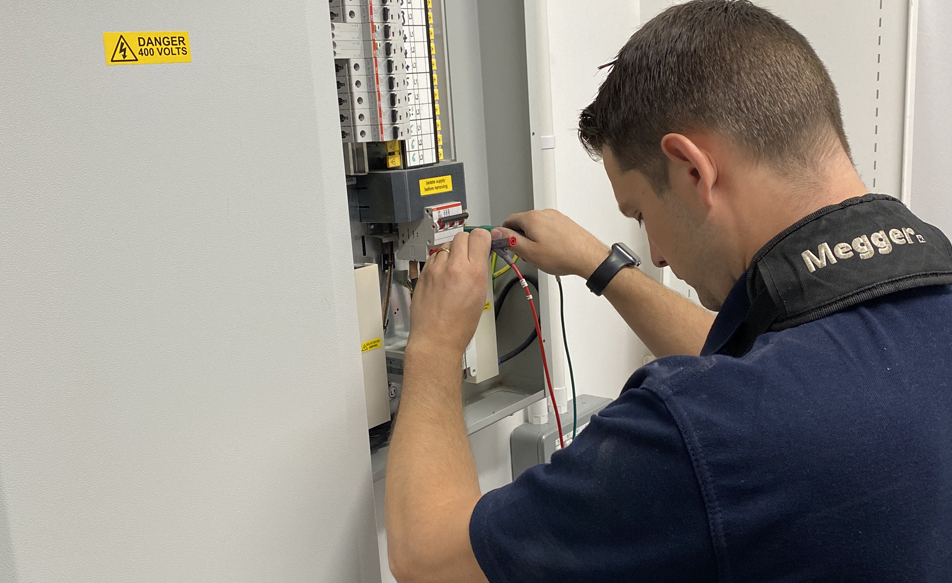
What Is An Electrical Contractor
Welcome to our Liverpool Electrical Contractor Service, your one-stop-shop for all your electrical needs. Our team of certified electricians provide top-quality electrical services for residential, commercial, and industrial properties. From installations to repairs, we offer a range of services to keep your property powered up and running smoothly. Contact us today for a free consultation and estimate!
What does an Electrical contractor do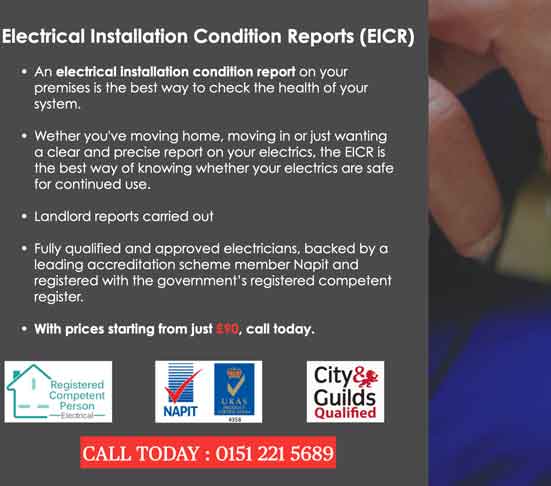
EICR Certificate – Venture Electricians Liverpool
Ensure the safety of your property with our Liverpool Electrical EICR Certificates. Our team of certified electricians conduct thorough inspections of your electrical systems and issue Electrical Installation Condition Reports (EICR) to verify that they are safe and up-to-date with regulations. We provide reliable, efficient, and cost-effective services to keep your property in compliance with industry standards. Contact us today to schedule your inspection!
Electrical Wiring Regulations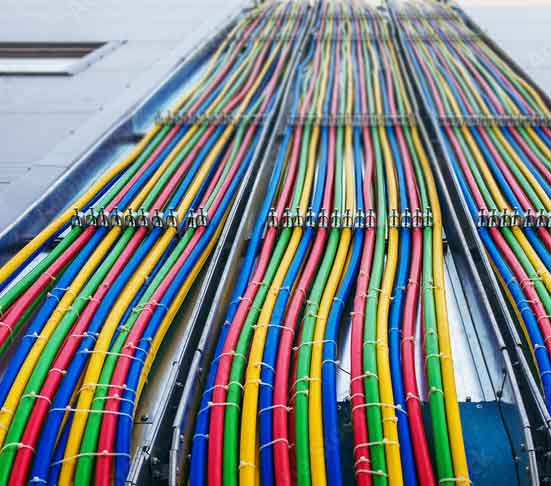
Electrical Wiring
Need electrical wiring services for your home or business? Look no further than our local Domestic and Commercial Electrical Wiring Services. Our team of experienced electricians provide a range of electrical services, from installations to repairs, for both residential and commercial properties. We pride ourselves on delivering top-quality services that meet the highest safety and quality standards. Contact us today to schedule a consultation!
Electrical Wiring Information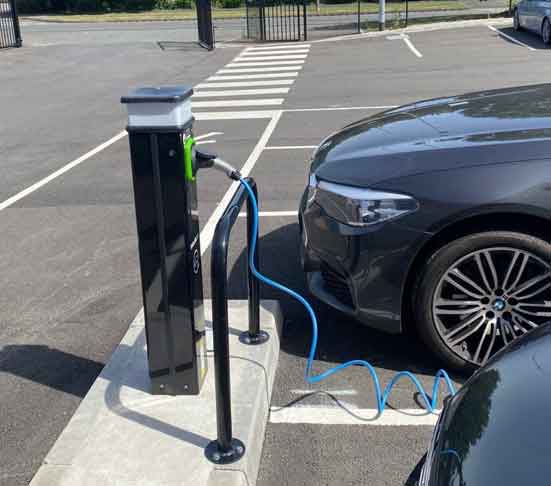
Electric Vehicle Charging Station – Venture Electricians Liverpool
Welcome to our Electric Vehicle Charging Station Services, your go-to destination for all your EV charging needs. Our team of certified electricians specialize in installing and maintaining EV charging stations for both residential and commercial properties. We offer reliable, efficient, and cost-effective services to keep your EV powered up and ready to go. Contact us today to learn more about our services and schedule your installation!
EV Charging Station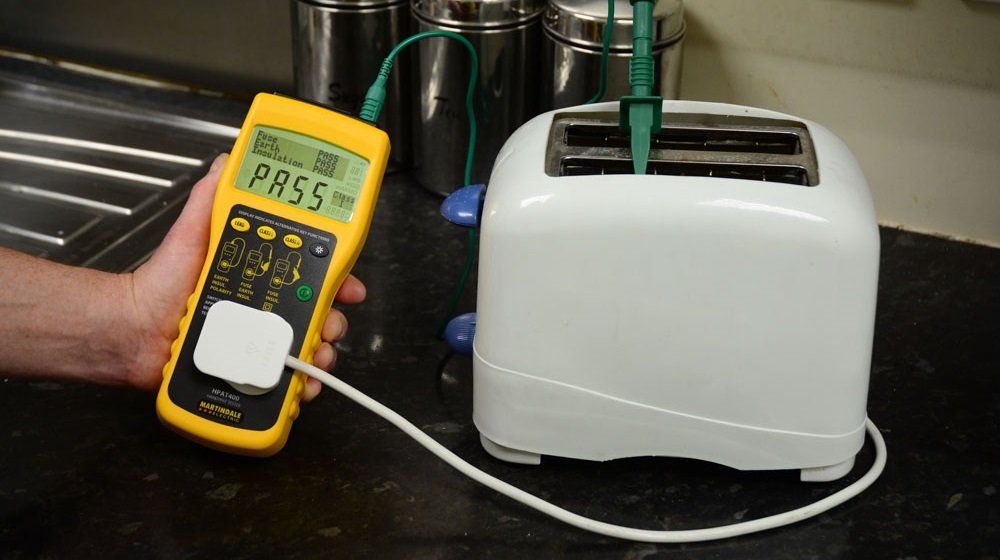
Portable Appliance Testing
Ensure the safety of your electrical appliances with our Electrical Portable Appliance Testing (PAT) service. Our team of certified electricians provide reliable and efficient testing to ensure that your appliances are safe and up-to-date with industry standards. We offer a range of services to both residential and commercial properties, including inspections, testing, and repairs. Contact us today to schedule your PAT service and keep your property safe!
PAT Testing – Venture Electricians Liverpool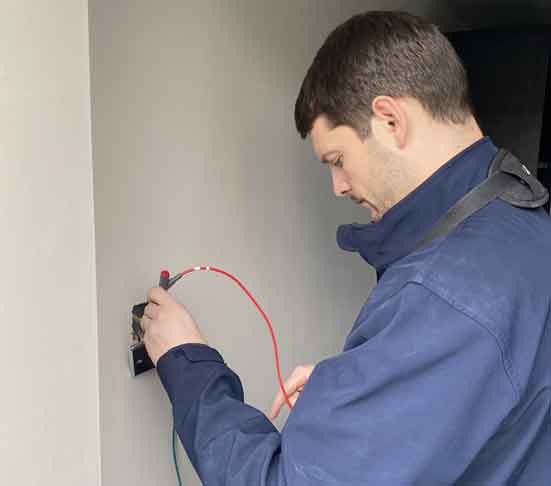
Approved Electrical Fault Finding
Welcome to our Approved Electrical Fault Finding service, where we pride ourselves on being the go-to source for diagnosing and repairing electrical faults. Our team of certified electricians use the latest equipment and techniques to quickly and accurately identify and fix electrical issues. We offer reliable and efficient services to both residential and commercial properties. Contact us today to schedule your fault finding service and get your property back up and running!
Finding Electrical Faults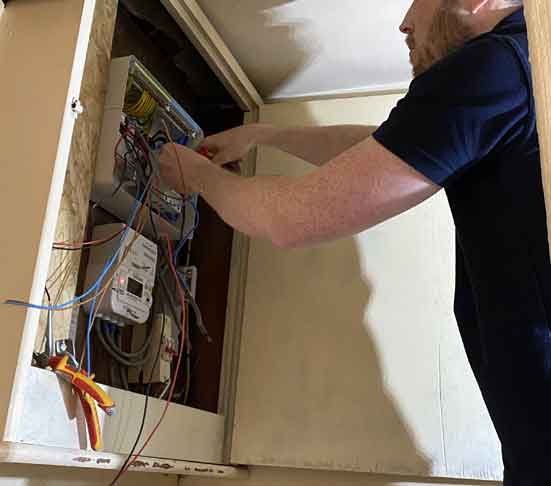
When Does A House Need Rewiring?
At Venture Electrical Ltd we provide approved electrical rewiring services for homes and businesses. Our team of certified electricians specialize in rewiring properties to ensure the safety and functionality of electrical systems. We offer reliable and efficient services at competitive prices, using only the highest quality materials and techniques. Contact us today to schedule a consultation and keep your property safe and up-to-date with industry standards.
House Rewiring – Renewing Electrical Wiring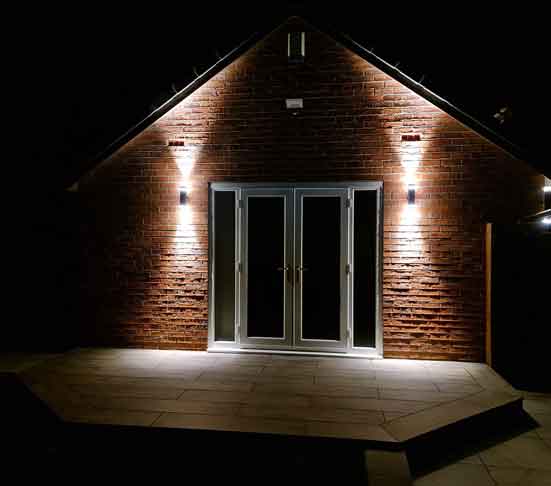
Light Fittings and Fixtures
Welcome to Venture Electrical Ltd's Light Fittings and Fixtures Installation And Repair Service. Our team of certified electricians provide reliable and efficient services for installing and repairing all types of light fixtures and fittings for homes and businesses. We use only the highest quality materials and techniques to ensure that your property is well-lit and functional. Contact us today to schedule your installation or repair service and brighten up your space!
Install Light fixtures and Light Fittings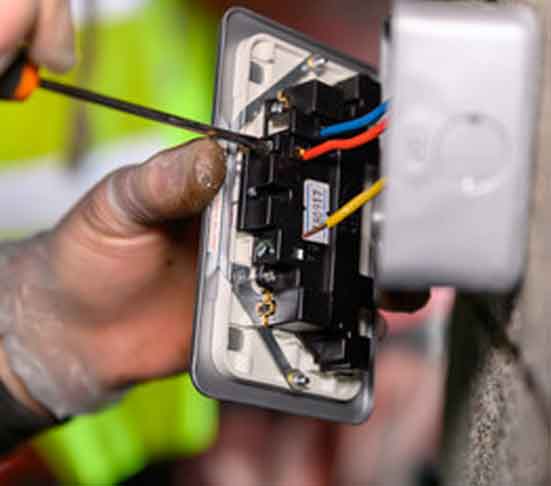
Installing And Replacing Outlet Sockets and Switches
Looking to install or replace outlet sockets and switches in your home or business? Our team of certified electricians provide reliable and efficient services for Installing And Replacing Outlet Sockets and Switches. We offer a range of services to keep your electrical systems up-to-date and functioning properly. Contact us today to schedule your installation or replacement service and keep your property powered up!
Plug Sockets and Light Switches